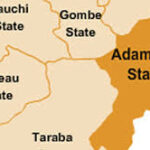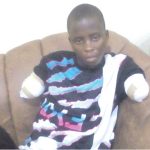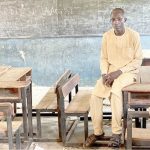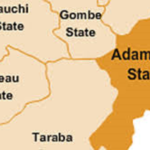Nine-year-old Abdullahi Hamza is a primary 2 pupil of Capital School, Yola.
He is attempting to finish up his homework before the next class. But he will not be seeing his teacher. He will listen to her on the local FM radio.
He spends 30 minutes listening to his teacher on Gotel radio on Tuesdays and Thursdays every week.
With schools closed due to lockdown imposed in the wake of the coronavirus pandemic, many students have been out of school.
United Nations estimates more than 360 million learners out of school spaces due to the pandemic.
According to a baseline survey conducted by the African Centre for Leadership, Strategy and Development (Centre LSD) on the number of out of school children in Adamawa State shows that about 886,634 of Adamawa’s children are out of school.
The home-schooling radio programme is bringing school to them.
 Forced out by a virus
Forced out by a virus
The three-month home-schooling radio programme is designed to target 500,000 children out of school in both rural and urban communities in Adamawa and Gombe states.
Pupils in primary 1 and 2 listen to the radio between 4pm and 4.30pm every Tuesday and Thursday. A companion workbook serves as guide through the programme on both Radio Gotel in Adamawa and Progress Radio in Gombe.
It is to bring qualitative, sound education during the lockdown.
Insurgency and coronavirus pandemic have been major challenges affecting the learning strides of every child in the north-eastern region.
The Strengthening Education in North East Nigerian States (SENSE) project implemented by the American University of Nigeria (AUN) is to bridge the gap in education of pupils through Hausa literacy radio programmes in urban and rural communities.
It is funded by the United States Agency for International Development (USAID).
Deputy Chief of Party SENSE, Dr. Grace Malgwi stresses the need to strengthen the education system through capacity development and provision of teaching and learning materials so as to deliver access to quality education in Adamawa and Gombe states.
She regretted the closure of schools due to Covid-19 pandemic and emphasized on the need to find better alternative means of supporting children to learn outside school adding that they are to intervene in eleven local government of Adamawa State.
However, due to the socio-economic status of parents, the overwhelming majority of them lives in abject poverty and therefore can hardly have access to power, internet connectivity and technological devices.
Hence, radio is considered the most effective means.
 Let’s read
Let’s read
A headmistress of Golomba Primary School, Hauwa Ibrahim Butu, said the “Mukaranta” meaning “Lets read “developed under USAID/NEIPlus and the Hausa Reading and Numeracy Activity (RANA) materials developed under DFID/UNICEF/FHI360 already in use in SENSE intervention, and consists of 13 episodes of 30 minutes each.
She says getting children of nomadic farming families to listen to the radio while the homeschooling programme is on air is difficult.
Families would rather take their cattle about for grazing.
“Most of the challenges we have encountered are from the Fulani nomadic farmers who usually go for rearing of cattle in the morning and come back in the evening when the programme had already finish for the day,” she said.
“A parent disclosed to me that it is better for the kids to learn on how to farm and rear the animals than sitting in the house listening to the radio.”
Hauwa said the workbook given to her was not enough to go round and was left with no alternative than to give a book per house.
She shared her success stories too that children are no longer idle but have been engaged with the home-schooling radio programme adding that most of them can now read and know the meanings of words since the programme is in Hausa language which made it easy for them to understand.
“It will interest you to know that despite the challenges, most of the Fulani nomadic kids can now read and write some even speak some words and knows their meanings”.
A parent, Fadimatu Usman a mother of seven, reiterates the economic hardships faced due to the pandemic.
Many parents could not afford batteries for their radios, she said.
She has volunteered to get batteries for affected families so children can listen to the radio when the programme is on.
She solicits donors to provide adequate workbooks and batteries for parent so as to reach out to other children.
Fadimatu observed that the home-schooling radio programme had played a vital role in the children’s life explaining that it had yielded positive results because most of the kids are learning so many things.
Coordinator social mobilization of Better Education for all (BESDA), Ahmad Muhammad said most of the areas are remote and can hardly have clear reception talkless of listening to the programme.
 56,000 learners
56,000 learners
Responding to the inadequacy of workbooks, he said BESDA is to cover primary one while SENSE is to cover Primary one and two and the work books produced are based on the data collected for 56,000 learners which covering only primary 1 of 11 local government areas.
“In our action plan, we only cover for P1 this year while SENSE is covering P1, P2 and P3 so there would be gap.”
“We have recorded so many success stories through use of phone and ask parents about their challenges, successes and the clear signal of the radio, we have found out that most parents are fully involved in the program which is a plus on our side”.
“We have sensitized school-based management committee as well in order to go round their communities on the use of the home learning program. These are achievements because the programme is advocating to the grassroots. We have also encountered a signal challenge not reaching out to some areas,” he stated.
Ahmad said parents, government and the community leaders need to come together to find ways where electronic media is used in teaching and learning to bridge the gaps created by the coronavirus pandemic.
Abdullahi Hamza used to do his homework with the help of his parents. These days he does it alone, and understand the words—their meanings and spellings—better.
But he cannot wait for school to reopen. He misses his friends and teachers more than the radio can take their place.
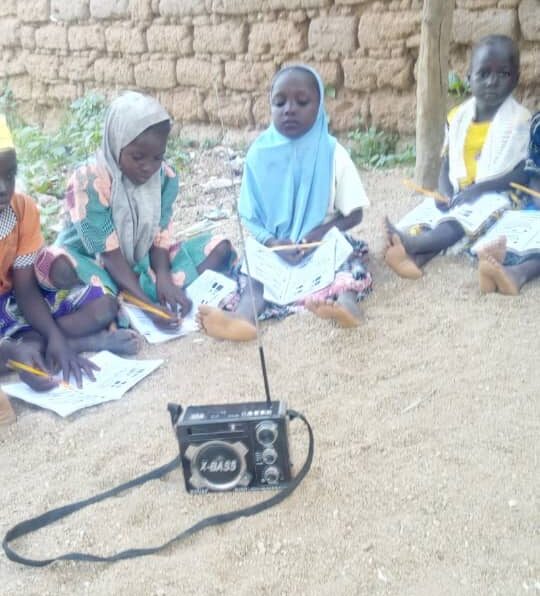
 Join Daily Trust WhatsApp Community For Quick Access To News and Happenings Around You.
Join Daily Trust WhatsApp Community For Quick Access To News and Happenings Around You.